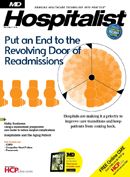Publication
Article
MDNG Hospital Medicine
Congestive Heart Failure
//Online CME
Credits: 0.25
Fee: None
Expires: June 26, 2011
Multimedia: None
This activity utilizes case-based lessons to help participants learn how to better classify heart failure stage in patients; identify key diagnostic tests for confirming the diagnosis of heart failure; and identify risk factors for mortality in heart failure patients. Contemporary medical management of systolic heart failure and strategies for reducing readmissions for decompensated heart failure are also reviewed.
//The Educated Patient
February is American Heart Month, and therefore, the perfect time to highlight this American Heart Association (AHA) site, where patients can watch videos depicting what happens during heart failure (HF); read about the signs and symptoms of the condition, how a healthy heart works, and the conditions that might lead to heart failure; and learn about the steps that can be taken to prevent and treat HF, including lifestyle changes, medications, surgery and ongoing care. Visitors to this site can also print a list of questions to ask their doctor, download patient information sheets and brochures that address living with HF, subscribe to an e-newsletter, and read stories from HF patients.
Available to view as an interactive multimedia tutorial, a self-running presentation, or the text version, this site covers a lot of ground; visitors can learn about the functions of the heart, what happens during heart failure (HF), the levels of congestive HF, what the symptoms are and when to call a doctor, what questions the doctor will ask, what happens during a physical test, and what tests might be ordered. Information on what type of medications are prescribed and how they work and what procedures might be advised for HF patients is also included, along with a list of 10 lifestyle tips for patients.
//Medical Websites
The 2010 HFSA Comprehensive Heart Failure Practice Guideline
Knowledge about heart failure “is accumulating so rapidly that individual clinicians may be unable to readily and adequately synthesize new information into effective strategies of care for patients with this syndrome.” The Heart Failure Society of America (HFSA) published this set of guidelines to “address the full range of evaluation, care, and management” of the condition. Among the many topics addressed in the guidelines are: evaluation of patients, nonpharmacologic management, reduced ejection fraction, advance directives, electrophysiology testing, surgical approaches, acute decompensated HF, ischemic heart disease, hypertension and HF, HF in special populations, and genetic evaluations.
//Videos
Living with Congestive Heart Failure
In this 53-minute video, Michael Harper, MD of the University of California, San Francisco, addresses the problems that heart failure poses for elderly patients.
An Alternative for Heart Failure Patients
In 2010, James Slater, MD, a cardiothoracic surgeon at Morristown Memorial Hospital in Morristown, NJ, became one of the first surgeons to implant the HeartMate II Left Ventricular Assist System into a patient. Slater describes the procedure, and what it can mean for patients with advanced-stage heart failure who don’t qualify for a transplant.
//From the Literature
The “Heart Failure Belt” in the Southeastern US
The southeastern region of the United States is known as the “stroke belt”; researchers analyzed CDC data to determine whether a similar geographic variation in heart failure mortality exists. They found that the heart failure mortality rate for the six contiguous southeastern states (Alabama, Arkansas, Mississippi, Oklahoma, Louisiana, and Georgia) was 69% higher than the national rate.
Worsening Renal Function in Patients with Acute Decompensated HF
A study of 657 patients with acute decompenstated heart failure presenting to the emergency department showed that a significant percentage (21%) developed worsening renal failure, which was linked to significantly worse outcomes. However, “the clinical parameters failed to adequately predict its occurrence, making a tailored therapy approach impossible.”





